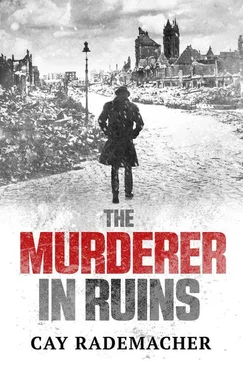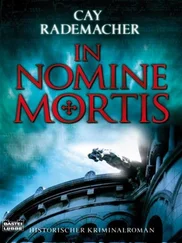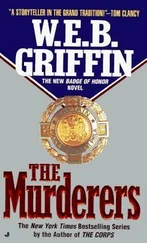Cay Rademacher - The Murderer in Ruins
Здесь есть возможность читать онлайн «Cay Rademacher - The Murderer in Ruins» весь текст электронной книги совершенно бесплатно (целиком полную версию без сокращений). В некоторых случаях можно слушать аудио, скачать через торрент в формате fb2 и присутствует краткое содержание. Год выпуска: 2015, ISBN: 2015, Издательство: Arcadia Books Limited, Жанр: Триллер, на английском языке. Описание произведения, (предисловие) а так же отзывы посетителей доступны на портале библиотеки ЛибКат.
- Название:The Murderer in Ruins
- Автор:
- Издательство:Arcadia Books Limited
- Жанр:
- Год:2015
- ISBN:9781910050750
- Рейтинг книги:5 / 5. Голосов: 1
-
Избранное:Добавить в избранное
- Отзывы:
-
Ваша оценка:
- 100
- 1
- 2
- 3
- 4
- 5
The Murderer in Ruins: краткое содержание, описание и аннотация
Предлагаем к чтению аннотацию, описание, краткое содержание или предисловие (зависит от того, что написал сам автор книги «The Murderer in Ruins»). Если вы не нашли необходимую информацию о книге — напишите в комментариях, мы постараемся отыскать её.
The Murderer in Ruins — читать онлайн бесплатно полную книгу (весь текст) целиком
Ниже представлен текст книги, разбитый по страницам. Система сохранения места последней прочитанной страницы, позволяет с удобством читать онлайн бесплатно книгу «The Murderer in Ruins», без необходимости каждый раз заново искать на чём Вы остановились. Поставьте закладку, и сможете в любой момент перейти на страницу, на которой закончили чтение.
Интервал:
Закладка:
‘Exactly. The ground level ruins have all been stripped long ago. We brought carbide lamps to illuminate the cellars.’
‘And you took those down with you?’
The scrap metal man nodded, looking as if he wanted to go behind a wall and throw up, but in the end he managed to pull himself together.
‘We came down the steps and lit up the first room, then the second. All of a sudden I spotted a naked foot.’
‘What about you?’ Stave turned to the workman.
He glanced up and said, ‘I was behind the boss. I didn’t see anything. Herr Hoffmann called out, “There’s a body.” And we got out of there.’
‘Anything else unusual strike you?’
‘That was unusual enough.’
‘You didn’t see anybody?’
Both of them shook their heads.
‘Were you here over the previous few days? You said you’d found a baking tray here.’
‘Three days ago I took a shortcut I’d not taken before. That was when I spotted it in a partly blocked cellar entrance, and then I got the idea to bring the carbide lamps. Apart from that I’ve never been here before.’
‘Do you know if there’s anyone here regularly? Somebody else who might take the same shortcut.’
Once again they shook their heads.
Stave nodded and dismissed the pair of them.
‘Anything new?’
Stave was standing in front of his boss. Cuddel Breuer wasn’t looking at him. He was staring at a sniffer dog wandering, half frozen and unenthusiastically, around the rubble. ‘He can’t find a scent,’ he remarked.
Stave ditched the formalities too. ‘Dr Czrisini reckons the body had been here for several days. Doesn’t look like this was the scene of the crime.’
Breuer nodded silently, then dug deep into his broad overcoat and pulled out a big flashlight, and still without saying a word went down the steps into the cellar.
He doesn’t trust me any more, Stave thought.
A few minutes later, Breuer came out again. ‘You’ve got one damn difficult case on your hands, Stave. Come and see me when you’re done here.’ He turned around and left without saying goodbye.
At least you didn’t find any more than I did, Stave said to himself, sombrely.
As Breuer turned round a remnant of wall twice the height of a man, he nearly collided with a figure stumbling through the ruins: Kleensch from Die Zeit.
‘Looks like everything’s about to hit the fan today,’ Stave muttered. He dithered for a second. Should he just ignore the reporter? Dismiss him? But then he would nose around, ask questions. Cause trouble. Better to take things in hand. Stave went up to the reporter, shook his hand and led him down into the cellar.
‘A new rubble murderer victim,’ the journalist said, looking at the body in the yellowish light of the torch. Calmly.
He’s already thinking about the article he’s going to write, Stave realised. He told Kleensch everything they knew and indicated the clues that suggested the victim had been well-to-do.
‘Nowadays it seems nobody notices when the rich go missing, just like the poor. That really is democracy,’ Kleensch quipped.
‘You’re not going to write that?’
He smiled. ‘I don’t think my publisher would like to see that in print. And the British wouldn’t like it either. I prefer to hold on to my job. Cigarette?’
‘Please don’t smoke at the crime scene,’ the chief inspector replied, shaking his head at the same time. He waved a hand back towards the door.
‘Nobody would want to read that,’ he said when they were back outside, in a half-hearted attempt to stop the man writing his story.
Kleensch gave him a wry smile. ‘I’m afraid you’re wrong there, Chief Inspector. People enjoy reading murder stories. Horrible stories. The problem is nobody heeds the moral of the story. So I shall leave out the philosophical bit and concentrate on the details. If you know what I mean.’
Stave nodded in resignation. ‘You do your job and I’ll do mine.’
‘People are going to be afraid even if I were to promise you to be economical with the truth. The rubble murderer is becoming a personification of evil, a bogeyman. It’s as if he’s given this vile cold a human face, even if nobody knows what it looks like. It could be anyone. Every figure walking along the street behind me, every shadow in the ruins, every taciturn new neighbour. People are starting to suspect one another. We could end up with more accusations than we had under Hitler. But there’s not much to do about it. People are going to give you hell, I’m afraid. But sooner or later you’ll catch the villain responsible. And then you’ll be a hero.’
‘I appreciate your optimism.’
‘It’s necessary. Especially in the face of death.’ Kleensch doffed his hat and stumbled away.
At least he didn’t talk to anybody else, Stave reflected. It wouldn’t have been good news if he’d started annoying Breuer with his questions, or Stave would have had to explain himself.
A while later Stave drove back to the office in the Mercedes, alone. Maschke had declined a lift under the flimsiest of excuses – he preferred to walk to keep fit. Driving along Jungfernstieg the chief inspector suddenly stepped on the brakes. The car spluttered to a halt in a few metres. This is my opportunity, Stave thought.
For the past few days, despairing over his lack of leads, Stave had considered involving a psychologist, and had asked around as to who the best in Hamburg were. But then he had put the idea to one side. Partly because he was embarrassed about the idea; nobody much in the murder squad had high regard for psychologists. Partly because he was ashamed that doing so would show his colleagues how little confidence he had: going to a shrink. Who knows, maybe he should put himself on the couch.
Not on your life.
But here he was, purely by chance, on his own and as it happened one of Hamburg’s best-known psychologists had his practice right here, on the Jungfernstieg. Professor Walter Burger-Prinz.
Stave walked down the almost pristine, elegant street that led gradually to the glittering ice of the Alster on his right. To his left stood the colonnaded facades of the grand buildings that had survived the firestorms intact. Once again the chief inspector was overcome by a sense of rage at the injustice. Why had all this pomp and grandeur, based on greed and inequality, survived?
He pulled himself together. It was hardly a psychologist’s fault that the British had preferred to wipe out the working-class districts rather than the grand boulevards.
He couldn’t remember the number of the building where the practice was located, but as he walked along slowly he soon came across a large noticeboard with the professor’s name on it. Fifth floor. The chief inspector pushed open a door nearly three metres high. Light-coloured marble and wrought-iron banisters, but no light bulbs left in the chandelier, he was pleased to see. The old-fashioned lift in the centre of the stairwell was out of order, because the electricity was off. Stave slowly began the long climb up the stairs.
When he finally reached the practice anteroom, however, he found himself up to his ankles in thick-piled carpets looking at an English club armchair, a desk and a teak bookshelf, which along with the scent of Earl Grey tea and furniture polish, made Stave, in his worn-out shoes, tatty suit and torn overcoat, feel grubby. Behind the desk sat a female receptionist in her fifties, with hair pulled back tight and wearing a pair of nickel glasses.
‘May I help you?’
But it sounded more like, ‘No dogs or beggars!’
Stave had intended to ask if the professor might see him, just for a few minutes. But the intimidating facade, the endless marble staircase, the heady scent in the air and now this dismissive receptionist had wound him up more than he could take. Angrily, he marched up to her desk and slammed his police ID down in front of her nose.
Читать дальшеИнтервал:
Закладка:
Похожие книги на «The Murderer in Ruins»
Представляем Вашему вниманию похожие книги на «The Murderer in Ruins» списком для выбора. Мы отобрали схожую по названию и смыслу литературу в надежде предоставить читателям больше вариантов отыскать новые, интересные, ещё непрочитанные произведения.
Обсуждение, отзывы о книге «The Murderer in Ruins» и просто собственные мнения читателей. Оставьте ваши комментарии, напишите, что Вы думаете о произведении, его смысле или главных героях. Укажите что конкретно понравилось, а что нет, и почему Вы так считаете.











